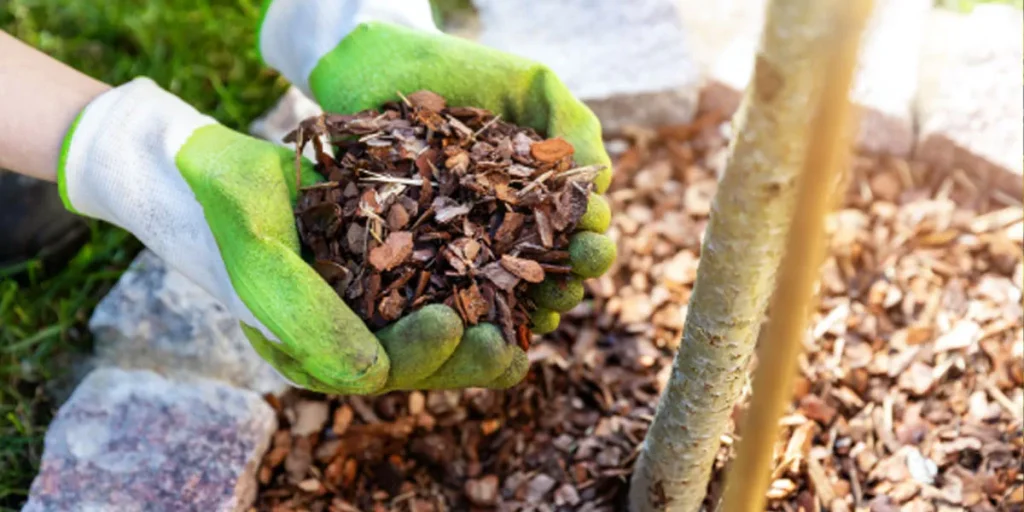A 1.5 cubic foot bag of mulch typically weighs about 20 to 40 pounds. The exact weight can vary based on the mulch’s moisture content and type.
Mulch is a garden essential that serves multiple purposes, from enhancing soil quality to suppressing weeds.
The weight of mulch is an important factor for gardeners and landscapers to consider during purchase and transportation.
Available in a variety of materials like wood chips, straw, and rubber, the density and moisture of these components directly impact the weight.
One of the key considerations when buying mulch is the area that needs to be covered, as this determines how much mulch to purchase.
Planning for the right amount of mulch is crucial for budgeting and for the successful completion of gardening and landscaping projects.
Buyers looking for mulch should also stay informed about the different types and their specific weights to ensure they choose the best option for their outdoor space.
Unearthing The Heft: 1.5 Cu Ft Of Mulch

Digging into your gardening with gusto? Understanding the weight of mulch is essential. The heft it brings to your garden beds is more than just bulk.
For those using 1.5 cubic feet bags, knowing what that weight entails is key. Mulch weight can influence everything from the shipping cost to the effort needed to spread it around your plants.
So, let’s scoop up the facts and get a handle on how much 1.5 cubic feet of mulch weighs.
Factors Influencing Mulch Weight
Not all mulch is made equal and several factors can tip the scales:
- Type of Mulch: Organic materials vary in density and moisture.
- Moisture Content: Wet mulch is heavier, with water adding weight.
- Compaction: Tight packing can increase a bag’s weight.
- Wood Type: Hardwoods weigh more than lighter woods like pine.
Average Weight Range For Mulch
Considering the variables, a 1.5 cubic feet bag of mulch typically weighs:
| Type of Mulch | Average Dry Weight | Average Wet Weight |
|---|---|---|
| Bark Mulch | 20 lbs | 30 lbs |
| Hardwood Mulch | 40 lbs | 50 lbs |
| Cypress Mulch | 20 lbs | 45 lbs |
| Pine Bark Nuggets | 15 lbs | 25 lbs |
These figures are estimates. Real-world weights can shift above or below these ranges. Remember to gauge the heft with these guidelines and adjust your garden plans accordingly.
Mulch Types And Their Weights

Understanding mulch types and their weights is crucial for any gardening project. Mulch comes in various forms, with each type having a different weight.
The weight affects how you handle and apply it to your garden. Let’s explore the differences.
Weight Comparison Between Organic And Inorganic Mulches
Organic and inorganic mulches vary significantly in weight. Organic mulches, made from natural materials like wood chips, leaves, or straw, have a lighter weight.
Inorganic mulches, such as rubber or rock, are heavier and denser. Here’s a quick look:
| Mulch Type | Approximate Weight per 1.5 Cu Ft |
|---|---|
| Organic Mulches | 20-40 lbs |
| Inorganic Mulches | 45-50 lbs |
The table outlines the basic weight differences. Remember, individual product weights may vary.
The Impact Of Moisture Content On Mulch Weight
Moisture content plays a pivotal role in the weight of mulch. When mulch is damp or wet, it becomes much heavier. Let’s look at some points:
- Dry mulch is lighter and easier to spread.
- Wet mulch can weigh twice as much as dry mulch.
- Always check the weather forecast before buying mulch.
Keeping an eye on moisture levels ensures you don’t overtax yourself with a heavier load than anticipated.
Choose the right type and quantity for your gardening needs with this knowledge in mind.
Practical Tips For Handling And Transporting Mulch
Practical Tips for Handling and Transporting Mulch can save garden enthusiasts time and effort.
Understanding how much 1.5 cu ft of mulch weighs is crucial when planning for your garden project.
While the weight can vary depending on the type of mulch, a rough estimate is that 1.5 cubic feet of mulch can weigh between 20 to 50 pounds.
Safely Moving Heavy Mulch Bags
- Lift properly: Bend at the knees, not the waist, and use your legs to lift.
- Use a wheelbarrow: This saves multiple trips and reduces strain on your back.
- Work in pairs: If the bag is too heavy, get some help to share the load.
- Slide, don’t lift: On smooth surfaces, sliding is easier than lifting.
Calculating The Number Of Bags For Your Garden Project
Knowing the number of bags needed is essential for budget and transportation plans. Use the following formula:
- Determine area: Measure the garden space (length x width).
- Depth desire: Decide how deep the mulch layer should be.
- Calculate volume: Multiply the area by the depth (area x depth).
- Convert cu ft to bags: Use the volume of one bag to find the total number needed.
Note: Since standard bags cover 4 sq ft at a depth of 3 inches, you’ll need one bag for each 4 sq ft of area.
| Area (sq ft) | Depth (inches) | Bags Needed (1.5 cu ft bags) |
|---|---|---|
| 100 | 3 | 25 |
| 50 | 3 | 12.5 |
| 25 | 3 | 6.25 |
Importance Of Accurate Weight Measurements
The Importance of Accurate Weight Measurements in landscaping cannot be overstated. Knowing the precise weight of materials, like mulch, is essential.
It helps in planning and executing projects with efficiency. Whether for small gardens or large landscapes, correct weight measurements ensure that landscaping projects go smoothly.
Why Weight Matters For Landscaping Projects?
- Estimates Project Costs: Weight determines delivery fees and material costs.
- Ensures Correct Coverage: Too little mulch may not cover the area. Too much could waste money.
- Helps Plan Labor: Knowing weight ensures appropriate workforce and equipment.
Consequences Of Miscalculating Mulch Weight
Inaccurate mulch weight causes issues. Mistakes in calculation may lead to unsuccessful project completions.
Misjudging 1.5 cu ft of mulch weight often leads to the following problems:
- Insufficient Quantity: Underestimating weight means not enough mulch for your project.
- Over-Ordering: Overestimating leads to unnecessary expense and waste.
- Structural Damage: Surplus weight might strain the landscape structure.
- Transportation Issues: Miscalculated weight affects vehicle load and may invite fines.
Considering Mulch Benefits And Uses
Exploring 1.5 cubic feet of mulch extends beyond its weight. Mulch brings life to gardens. Let’s dive into how it nurtures soil and decorates landscapes.
Enhancing Soil Health With Mulch
Mulch offers vital protection for soil. It keeps moisture in and heat out. Here’s how it works:
- Retains water: Mulch acts as a sponge. It holds water and gives it to roots.
- Prevents erosion: A layer of mulch shields soil from wind and rain.
- Enriches soil: As mulch breaks down, it boosts soil with nutrients.
- Controls weeds: Mulch blocks sunlight. This stops weeds from growing.
Aesthetic Advantages Of Mulch In Gardening
Mulch makes gardens look neat. It comes in many colors and textures. See the benefits:
- Uniform look: Mulch creates a clean, cohesive garden appearance.
- Color choice: From deep brown to red, mulch choices match any garden theme.
- Pathways: Mulch carves out pathways, making navigation easy.
FAQ About the Weight of 1.5 Cubic Feet of Mulch
What Is The Average Weight Of Mulch?
Mulch weight can vary, but on average, 1. 5 cubic feet of mulch weighs approximately 20 to 40 pounds.
This range depends on the mulch’s material and moisture content.
Does Mulch Type Affect Its Weight?
Yes, the type of mulch significantly impacts its weight. For example, heavier woods like oak will weigh more than lighter materials such as pine or cedar.
How Much Does 1.5 Cu Ft Of Rubber Mulch Weigh?
Rubber mulch is lighter than organic options; thus, 1. 5 cubic feet typically weighs around 20 to 30 pounds, although this can vary based on size and density.
Can Moisture Content Change Mulch Weight?
Absolutely, moisture content can greatly influence the weight of mulch.
When wet, mulch can weigh double or more than its dry counterpart due to absorbed water.
Conclusion
Summing up, the weight of 1. 5 cubic feet of mulch can vary broadly. It’s influenced by moisture content and material type.
For garden projects, weigh these factors to estimate your needs. Ready to enhance your landscapes? Grab your mulch today, keeping these insights in hand.
Resources:
https://www.usda.gov/peoples-garden/soil-health/mulch
https://calrecycle.ca.gov/organics/compostmulch/
